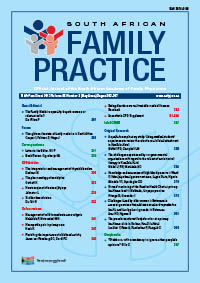Knowledge and awareness of high blood pressure in Ward F, Ifako-Ijaiye local government area, Lagos State, Nigeria
Keywords:
High blood pessure, knowledge, awareness, Ifako Ijaiye Local Government, Nigeria
Abstract
Objectives: In Nigeria, most people living with an elevated blood pressure are unaware of it until they suffer complications. The aim of this study was to determine levels of awareness of high blood pressure in Ward F, Ifako-Ijaiye local government area, Lagos, Nigeria. Design: A multistage sampling technique was used to select 250 participants as the study population. Setting and subjects: Trained interviewers administered questionnaires to collect information from the participants and measured their blood pressure to determine whether or not they had the correct information on their blood pressure readings. Outcome measures: The questionnaire included questions on respondents’ knowledge of high blood pressure, sources of information or knowledge, awareness of blood pressure status and blood pressure measurement. Results: Radio was found to be the most utilised source of information on high blood pressure. The level of awareness of high blood pressure was 79.2%, while 21.6% of participants were aware of having high blood pressure. However, 37.2% had high blood pressure readings. Conclusion: Even though the level of awareness among participants was relatively high (79.2%), the study showed that many people who had high blood pressure readings were unaware of having high blood pressure. The knowledge of high blood pressure among these participants was insufficient, especially in grassroots communities. There is an urgent need for community-based high blood pressure awareness programmes.
Published
2012-09-26
Section
Original Research
By submitting manuscripts to SAFP, authors of original articles are assigning copyright to the South African Academy of Family Physicians. Copyright of review articles are assigned to the Publisher, Medpharm Publications (Pty) Ltd, unless otherwise specified. Authors may use their own work after publication without written permission, provided they acknowledge the original source. Individuals and academic institutions may freely copy and distribute articles published in SAFP for educational and research purposes without obtaining permission.

